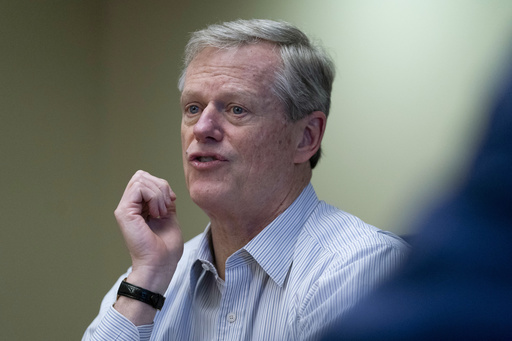WASHINGTON (AP) — NCAA President Charlie Baker said Friday that action by Congress was needed to protect what he described as the “95 percent” of athletes whose ability to play college sports would be endangered by a court ruling or regulatory decision declaring them as employees of their schools.
Speaking to a small group of reporters near the NCAA’s Washington office, Baker was realistic but still hopeful about the prospect of Congress doing what it didn’t do despite persistent requests from his predecessor, Mark Emmert: granting the NCAA a limited antitrust exemption that would allow it to make rules safeguarding college sports without the constant threat of litigation.
His comments took on more urgency when a Tennessee judge ruled Friday that the NCAA could not block schools from using name, image and likeness (NIL) money to recruit athletes. Baker was informed of the ruling during his meeting with reporters and declined to comment. The NCAA said later in a statement that the ruling “will aggravate an already chaotic collegiate environment.”
Baker in December proposed creating a new tier of Division I that would allow the schools that make the most money from sports to pay their athletes. But he doesn’t want internal NCAA reforms or a court ruling to endanger sports at the vast majority of member schools. The NCAA is facing several lawsuits and a unionization effort at Dartmouth that could result in athletes getting classified as employees
The employment model would not work at historically Black colleges and universities, he said, or at Division II or III schools.
“You’re talking about 95 percent of colleges that probably spend somewhere between … $40 million and $5 million on college sports, and they lose money,” Baker said. “They don’t have TV contracts and nobody can look at their income statements or balance sheets and conclude there would be a way for them to make money.”
Baker, a former two-term Republican governor of Massachusetts whose tenure as NCAA president hits the one-year mark on March 1, said he was encouraged by his conversations with members of Congress who agree with him that something must be done to safeguard and standardize players’ NIL rights and ensure that the NCAA can give athletes more opportunities to make money.
“I think in the end, we are going to need Congress to do something,” Baker said. “Because people will draw a lot of conclusions from court decisions. And then there will be new ones.”
He said he took the long view on congressional action and wasn’t counting on getting a bill passed during an election year in which priorities of both parties, including funding for border security and Ukraine, have stalled.
“I completely accept the fact that in the grand scheme of all the things Congress is working on, this one is probably not at the top of the pile,” Baker said.
Baker added that the antitrust exemption he is seeking is far narrower than what the NCAA has asked for in the past.
The NCAA and the Power Five conferences are not just counting on Baker’s powers of persuasion to achieve their goals on Capitol Hill. They spent a combined $2,970,000 on lobbyists in 2023, shattering their previous record by more than $700,000, according to lobbying records reviewed by The Associated Press.
The spending increase was fueled mostly by the Atlantic Coast Conference, which increased its lobbying budget by more than $600,000 and became the first conference to top $1 million in lobbying expenditures in a year. The Southeastern Conference upped its spending by more than $200,000. The ACC and SEC more than made up for a decline in spending by the Pac-12, which imploded last year when all but two of its member schools announced their departure for other leagues.
Two senators who have sparred with the NCAA took a dim view of the association’s prospects for getting help from Congress.
“The NCAA has a well-established history of backroom deliberations that produce unfair punishments for athletes, coaches, and universities. Until the NCAA gets it act together, any ‘get out of jail free cards’ for them are dead on arrival in Congress,” Sen. Marsha Blackburn, R-Tenn., said in a statement to The Associated Press. “The NCAA has damaged its priorities in Congress by pursuing its unfounded accusations against schools like the University of Tennessee and handing down unfair punishments.”
Sen. Chris Murphy, D-Conn., pointed to the NCAA’s spending on lawyers and lobbyists to protect what he sees as an unsustainable status quo.
“Now that the courts and states are forcing them to start treating athletes fairly, the NCAA is spending even more on expensive lobbyists in an attempt to convince Congress that all of a sudden, college sports are broken,” Murphy said in a statement to the AP, urging the NCAA to “start negotiating directly with the athletes to come up with an entirely new model that gives them the pay and protections they have long deserved. Until the NCAA takes these basic steps, simply coming to Congress to bail them out is not a reasonable approach.”
___
AP college football: https://apnews.com/hub/college-football
Home Politics Live Politics NCAA president says Congress must act to preserve sports at colleges that...
